The long-term goal of AFTA awards are to recognize members and practitioners for their achievements in agroforestry. AFTA awards enhance future programs and support continued interest in agroforestry practices. The AFTA Board of Directors offers four awards, granted biennially at the NAAC. The awards are Outreach and Education, Research, Early Career, Practicioner or Producer, and Significant Contriubtions to AFTA Board (nominated by AFTA board).
Dr. Badege Bishaw - Outreach and Education
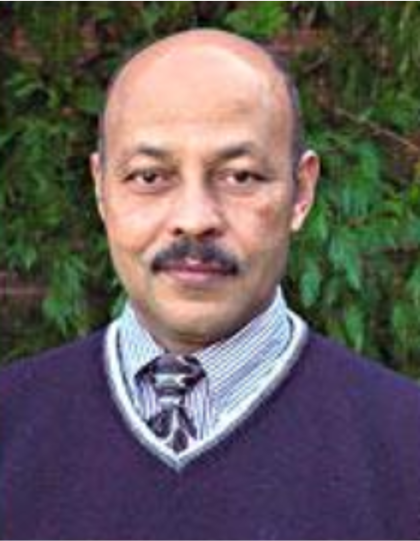
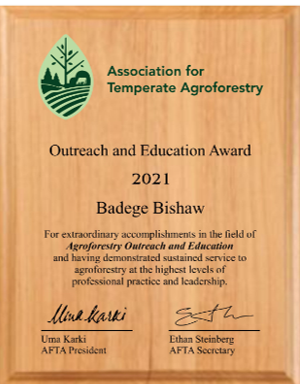
Dr. Badege Bishaw has played a leading role in agroforestry education and outreach in the U.S. and at the international level for many years.
Dr. Bishaw is a Senior Instructor in the Oregon State University College of Forestry, where he serves as the Director of the Sustainable Natural Resources and the Forests and Climate Change graduate certificate programs. He has developed and taught at least three different courses in Agroforestry, as well as courses on topics such as International Forestry and Natural Resources at OSU and at universities in South Africa and Ethiopia. He is also an active advisor of graduate students. In addition to his long track record as a university instructor and program director, Dr. Bishaw has been very engaged in outreach activities, both in the Pacific Northwest and internationally.
In the international arena, he has participated in research, outreach, formal instruction, and program development in South Africa, Ethiopia and southern Africa (Malawi, Mozambique and Zambia), some of which has been supported by USAID. This international work has involved outreach programs to address food security, watershed management, poverty alleviation, and land degradation, much of it through agroforestry. Currently, he leads a collaborative project between the World Agroforestry Center and OSU.
In the U.S. he is probably best known to many of you through his leadership roles, including serving as the Chair of the Pacific Northwest Agroforestry Working Group and as president of AFTA from 2017 to 2019. While serving as our president, he played the primary role in organizing the last North American Agroforestry Conference in Corvallis.
Dr. Bishaw has a multiple-decade record of outstanding contributions in the area of agroforestry outreach and education, not to mention in the areas of research and service to both the national and international agroforestry communities. He would be well-suited to receive at least three different AFTA awards! Thank you, Dr. Bishaw, for your outstanding leadership and service.
Tracey Coulter - Outreach and Education
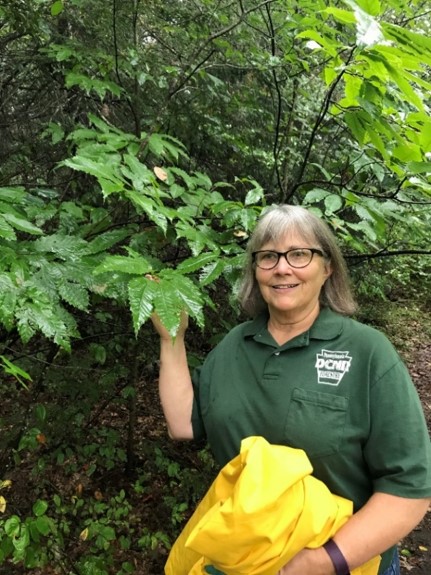
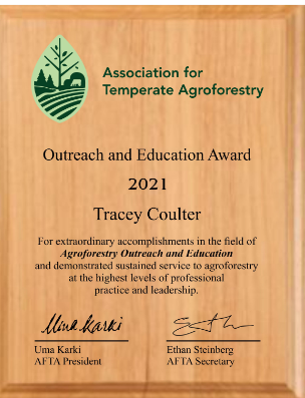
As one of the only agroforesters employed by a state forestry agency, Tracey Coulter has accomplished a tremendous amount in her career with the Bureau of Forestry to advance agroforestry in Pennsylvania and across the wider region. Her work also has served as a model for effective leadership in agroforestry through state government. From advocating for the relevance of agroforestry in reaching the Commonwealth’s watershed goals, which led to the creation of the agroforester position, to her leadership in grant writing and workshop design, to working to develop grant programs for innovative approaches, Tracey has supported countless farmers, technical assistance providers, and policymakers. Tracey has also been an incredible mentor to people interested in agroforestry and forestry careers through formal programs and informal advising. Her enthusiastic support of others, her humble expertise in chestnuts, and her willingness to think big has inspired agroforesters and led the field in agroforestry outreach.
Congratulations Tracey! Thank you for your contributions to agroforestry!
Research – Frank Lake

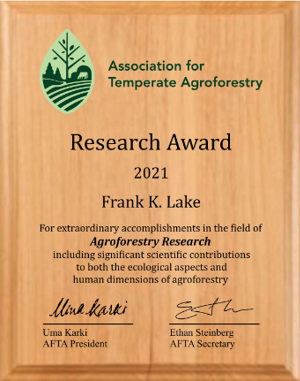
Dr. Lake grew up in northern California, where he learned about traditional ecological practices from the Karuk and Yurok Tribes. This must have been at least partly the inspiration for his career path, which led first to the University of California, where in 1995 he completed an individualized major in Integrated Ecology and Culture, along with a minor in Native American Studies, and later to Oregon State University, where he completed his Ph.D. in Ecology in 2007. That same year he started his career as a U.S. Forest Service Research Ecologist for the Fire and Fuels Program in the Pacific Southwest Research Station, where he has been ever since. As suggested by his background, job title and workplace, much of Dr. Lake’s research involves topics such as wildland fire effects, traditional ecological knowledge, ecological restoration, climate change, and ethno-ecology. Most of his work has focused on forest, shrub, grassland and riparian environments in the Klamath-Siskiyou bioregion.
Dr. Lake’s work in this area investigates the agroforestry practices of indigenous and tribal people in the Klamath-Siskiyou bioregion and is building collaborations around land management solutions that supports healthy forests and tribal communities. Dr. Lake has published extensively on the role of fire in managing indigenous agroforestry systems that support ecocultural resources such as traditional foods, medicines, and basket weaving materials.
In addition to his numerous publications on agroforestry, Dr Lake is active in presenting his work at scientific conferences, through webinars, and other means. Through this work he has become a well-known figure in the agroforestry world, particularly where it intersects with traditional ecological knowledge and practices. Finally, another vitally important contribution of Dr. Lake is that he serves as mentor and graduate committee member for several students working on tribal food security, wildland fire, and forest management, thereby helping to develop the next generation of scientists and managers.
Thank you, Dr. Lake, for your many contributions to the advancement of agroforestry!
Early Career Award – Hannah L. Hemmelgarn

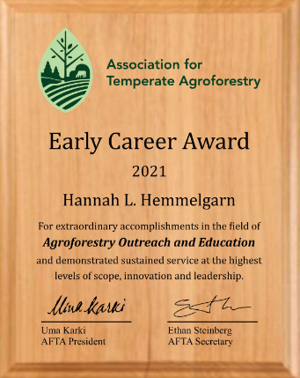
Hannah L. Hemmelgarn has demonstrated extraordinary and impactful accomplishment in the field of agroforestry education and outreach, as an Assistant Program Director with The Center for Agroforestry, University of Missouri, School of Natural Resources, College of Agriculture, Food and Natural Resource, in Columbia, Missouri
Among her many accomplishments, the development of the innovative, first-ever High School Agroforestry Curriculum was extremely significant. Under Hannah’s leadership, the Center for Agroforestry collaborated with Missouri high school agriculture science teachers, FFA, and the Missouri Department of Education to create this two-module teacher training curriculum. In 2018 and 19, High School teachers engaged via workshops offered in multiple locations throughout Missouri to learn through hands-on experience about agroforestry and this ready-to-use curriculum. These innovative course materials continue to be available on-line, with current information on the program and advising for agroforestry-based experience opportunities offered by direct inquiry.
With a Bachelor of Arts Degree in Anthropology, a Master of Science in Natural Resource with an emphasis in Agroforestry, a certification in Permaculture, and a certification as Environmental Educator, Hannah is not only passionate about agroforestry, but about making it accessible for all peoples and communities.
Through her work with the Center for Agroforestry and beyond, Hannah creatively connects partners, produces engaging and impactful educational resources, seeks to more deeply educate herself and colleagues, and is committed to innovative re-imagining of more just, equitable, and beautiful agricultural and social landscapes. Hannah’s focus on agroforestry goes beyond the practices themselves and into the ways that trees can shape the ways we live and organize our lives. Her focus on public education, connecting youth to agroforestry, decolonizing education and fieldwork, and deep collaboration with partners illuminate how Hannah is building strong ecosystems of mutual respect and support.
Hannah is involved with and/or created many public education and outreach series including the Agroforestry Podcast series, the Savannah Institute Nutshells talks, co-editor on both the University of Missouri Center for Agroforestry Action in Agroforestry and Green Horizons newletters. Hannah also has an impressive grant portfolio including a current pending proposal with the USDA New Beginnings for Tribal Students.
Congratulations Hannah Hemmelgarn! Thank you for your contributions to agroforestry!
Practitioner and Producer Award – Blake Dillman
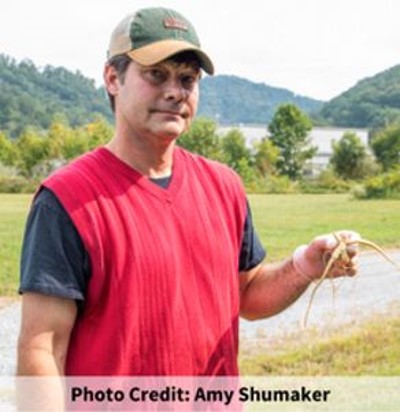
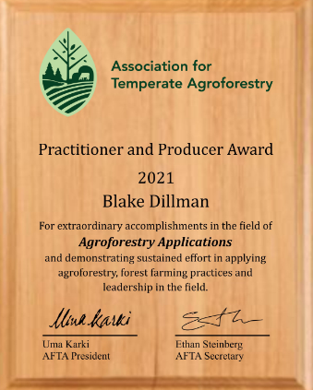
Blake Dillman has been engaged in the agroforestry practice of forest farming for the last 8 years on his properties near Blowing Rock, North Carolina and in Bluefield, Virginia. Blake took interest in forest farming after reconnecting with his family land and continues the tradition of stewarding the ginseng planted & transplanted by his grandfather over the last several decades.
Blake has become one of the largest suppliers of ginseng and other medicinal herbs for Appalachian Sustainable Development’s “Herb Hub” in Duffield, Virginia. He is the first producer to become ‘Forest Grown Verified’ and Organic Production Certified to sell produce via the Herb Hub. Since 2014, he has planted over 100 lbs of ginseng seed and countless rootlets back onto the family property in Bluefield. He has also established ginseng & goldenseal and other medicinal plants on his home property just outside of Blowing Rock, North Carolina. He is currently cultivating and/or stewarding ginseng, goldenseal, black cohosh, bloodroot, false-unicorn, blue cohosh, and Solomon’s seal.
Not only does Blake sell raw root & leaf material through the Appalachian Harvest Herb Hub, he has expanded into some added-value production as well. He harvests ginseng leaves from the tops of his plants in mid-summer, which allows him to produce ‘Four Prong’ ginseng tea that he sells at the High Country Food Hub in Boone, Watauga County, North Carolina. As an additional benefit, the harvest of ginseng leaves reduces the risk of theft/poaching pressure. With other root and leaf products, he makes & sells tinctures.
Blake is currently one of the partnering landowners with the North Carolina Cooperative Extension on a local seed sourcing project. Blake transplanted around 10 lbs of locally harvested ginseng rootlets on his North Carolina property to produce seed with local genetics. He has done the same with goldenseal, which was extirpated from Watuaha county over 50 years ago.
He has hosted multiple groups for educational tours on his properties. Groups of Extension professionals from NC State, Appalachian State, and North Carolina A&T State University have toured his property in Blowing Rock, as well as a consortium of speakers & resource specialists. He also serves as a “forest farming mentor” through Application Sustainable Development.
Congratulations Blake!
Significant Contribution to AFTA – Christine C. Nieman
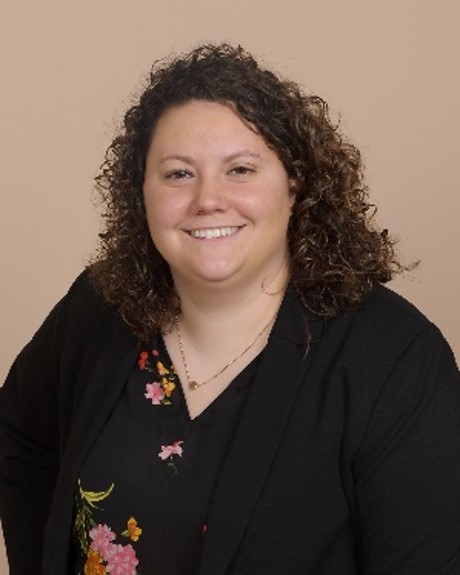
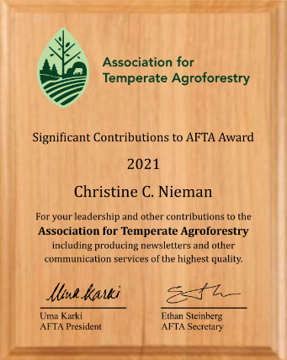
Dr. Christine C. Nieman has contributed significantly to the Association for Temperate Agroforestry (AFTA) for four years. Christine began contributing to the Association in 2017 by joining the Newsletter Committee as an editor for the quarterly newsletter. This newsletter is a highly effective outreach and educational effort of AFTA. Christine has demonstrated leadership and professionalism in delivering her editorial work to produce quality newsletters. In 2019, she became the chair of the Newsletter Committee. She has been taking care of all aspects associated with publishing the newsletter - from announcing for articles, conducting the review process, final editing, uploading the accepted articles onto the web, and making any needed final corrections for publication.
In 2020, she joined the AFTA board and broaden her contribution to the Association further by taking additional roles - especially in the communication aspects needed for the association. She is always willing to contribute and is a great asset to AFTA!
Congratulations Christine!

